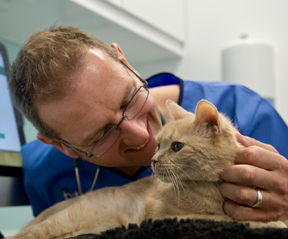!This story has an important update

Dr. Cat Henstridge 288

Photo courtesy of Dr. Cat Henstridge
Dr. Cat Henstridge believes that requiring cats to be microchipped would not only increase the chances of found cats being reunited with their owners or rehomed but also boost responsible pet ownership.
Veterinarians and animal-welfare charities are embracing a move by the United Kingdom toward mandatory microchipping of pet cats, a sign that the identification system could become as widespread globally for cats as it is for dogs.
Britain's ruling conservative government this fall issued a "call for evidence," inviting submissions from the public to help lawmakers understand the consequences of compulsory cat microchipping. The deadline for comments to Britain's Department for Environment, Food and Rural Affairs is Jan. 4.
"I think it's a fabulous idea," enthused Dr. Cat Henstridge, a veterinarian at Dore and Totley Vets in Sheffield. Henstridge works closely with Britain's Royal Society for the Prevention of Cruelty to Animals (RSPCA) to treat stray and injured cats.
Like most proponents of required cat microchipping, Henstridge said it would increase the chance of lost pets being reunited with their owners or given a new home, thereby improving animal welfare.
She believes that compulsory microchipping would have a further, perhaps even bigger, benefit of compelling more cat owners to establish a relationship with a veterinarian and therefore raise the likelihood of kittens being neutered.
"We've got a massive overpopulation problem with stray cats in the U.K., and microchipping is quite possibly the door to getting them neutered and stopping a lot of those strays being born," Henstridge said in an interview.
The British Veterinary Association does not yet have a formal position on compulsory cat microchipping, although it "strongly encourages" the voluntary practice, president Dr. Daniella Dos Santos told the VIN News Service.
"Microchipping is safe and effective and provides pets with a form of identification that lasts a lifetime, encouraging responsible ownership and enabling reunification of strays with their owners," Dos Santos said in an emailed statement. The BVA's policy team, she added, will be considering its position on compulsory cat microchipping this year.
Alice Potter, a cat welfare expert at the RSPCA, hopes stricter rules will save overstretched groups like hers precious time. "Most charities will keep unchipped cats for at least a week and often longer, and will make significant efforts to find an owner," Potter said. "This uses lots of valuable resources and can mean cats are kept in confinement for longer periods, which is often stressful for them."
About the size of a grain of rice, a microchip is inserted with a syringe under the skin between an animal's shoulder blades, in a process similar to vaccination. Each chip has a unique number that is communicated by a radio signal detectable by a microchip scanner. An animal's microchip number must be registered in order to be linked to its owner.
Compulsory microchipping around the world
At the moment, compulsory microchipping is much more common for dogs than cats.
In the U.K., for example, about 90% of the country's roughly 10 million pet dogs are microchipped, according to the government. The identification system became mandatory for canines there in April 2016. By comparison, an estimated 65% of Britain's roughly 11 million pet cats are chipped.
Microchipping of dogs is required in another 21 of the European Union's 28 member states, including in France, Italy, Spain and Sweden, according to the EU Dog & Cat Alliance, a collective of animal welfare advocacy groups. Outside Europe, microchipping of dogs is compulsory in countries including Israel and New Zealand, and in some Australian states.
On the cat side, compulsory microchipping has been introduced in France, Belgium, Greece and some parts of Spain and Australia. The practice appears to be spreading.
In June, Japan's parliament passed a bill requiring breeders to microchip all dogs and cats. Under the new law, dog and cat owners also will be obliged to notify authorities of changes in ownership, a spokesperson for the Japan Animal Welfare Society told VIN News.
The legislation will be enforced in five years' time; during the interval, procedures for registration and management will be discussed and finalized by the Japan Ministry of Environment, the spokesperson said.
The U.S. remains a holdout for mandatory microchipping, even for dogs. Competing business interests there have created a confusing market structure that would be harder to regulate.
One problem in the U.S. is that different types of chips with differing radio frequencies are used, and they cannot necessarily be read by every scanner. Also, owner data is not always freely accessible across competing registries.
By contrast, most countries in Europe use a uniform 15-digit microchip approved by the International Organization for Standardization, or ISO, that is widely considered to be the world standard. The countries also have single national databases or, as in the U.K., allow open access to different databases that are officially recognized and regulated by the government.
The case for cats versus dogs
The RSPCA's Potter suggested that dogs are more typically the object of mandatory microchipping because they are viewed as potentially more dangerous than cats as strays — dangerous both to humans and other dogs.
Further, the market for pedigreed dogs is much bigger than that for cats, and dogs are seen as particularly gregarious animals more capable of bonding with people. Consequently, she said, dogs may be considered to be more valuable financially and for companionship.
To be sure, dogs are far less likely than cats to roam freely from their owners. According to a recent report by the British animal welfare organization People's Dispensary for Sick Animals, known as PDSA, 71% of cats in the U.K. have access to the outdoors, where they are apt to be unsupervised and potentially run into trouble, whether fighting with other animals or falling under the wheels of a moving car.
In Sheffield, Henstridge said she sees at least one cat every week that has been killed or injured by a vehicle. Intact tomcats, she said, are particularly prone to problems because they often go roaming for mates, get into fights and can end up as roadkill. Local government workers regularly use microchip scanners to try to identify animals found dead on the road but many are found without microchips, Henstridge said.
"If they're not [chipped], you can't exactly put a picture of a mangled cat on Facebook and ask if anyone recognizes this animal," she said. "It's sad when a cat goes missing but to get that final answer of, 'Unfortunately Fluffy is no longer with us' — that's much nicer for the family."
Dr. Jeremy Campbell 288

Photo courtesy of London Cat Clinic
Dr. Jeremy Campbell, clinical director of the London Cat Clinic, says microchipping is a good idea even for house cats because there's always a chance an animal will escape outdoors and go missing.
Dr. Jeremy Campbell, clinical director of the London Cat Clinic, located in the heart of Britain's capital, also is a big fan of compulsory microchipping, even for an urban practice like his, where more than 95% of patients are house-bound.
"Some indoor cats still go for walks, some go to parks or the country, and an increasing number, thankfully, are going to the vet," he said. "The trip by car, taxi, bus or train is a potential exit opportunity for that determined feline with escape on their mind, especially if a carrier isn't up to the job — which isn't infrequent."
For outdoor cats, Campbell said, the case for compulsory microchipping is "obvious," whether it's bringing home animals that have gone walkabout, or finding the owners of feline accident victims. "The ability to more quickly inform these owners of their cat's whereabouts is huge," he said.
Henstridge noted that of the last 20 stray cats brought into her practice (some injured), just two were microchipped — indicating that government estimates of a 65% chip rate might not tell the complete story.
The discrepancy, she said, could be related to the fact that a lot of cats brought to charities or veterinarians were born as strays or neglected by owners. She recalls, for example, an incident a few weeks ago when the RSPCA pulled 40 kittens out of a single dilapidated home.
"There's a huge subpopulation of cats that won't show up in any survey until they end up being knocked down and injured," she said. "They are never microchipped and often have kept having kittens."
Pitfalls and possible solutions
One of the biggest challenges associated with microchipping is ensuring that owners regularly update their personal details on microchip registries. Unlike pet identification tags, the chips themselves do not contain owner information. Instead, they contain a number that is linked to a person's contact information housed in a registry.
In the U.K., dog owners found to have not microchipped their pets or updated their contact information face a fine of up to £500 (US$643) and risk of criminal prosecution.
While the threat of sanctions has not made the system foolproof, it appears to be largely effective. In the PDSA report, which is released annually and this year provides results of a survey of 5,036 pet owners, 92% of dog owners claimed their dog had been microchipped, and 86% said their contact details were up-to-date on a database.
Five percent stated that they had failed to update changes to their personal information. A further 6% indicated that they believed that their veterinary practice would have updated their details for them, while 3% were not sure if their details on the database were up-to-date.
Henstridge can attest to the success of Britain's canine microchip requirement: She can't remember the last time she has seen a puppy without a microchip. "Even the really bad breeders are doing it now," she said.
As for British cat owners who have voluntarily microchipped their pet, the PDSA reported that about 8% said they had not updated their registry information — something Potter at the RSPCA considers a big problem.
"We strongly propose that, as with dogs, new legislation on compulsory microchipping for cats must include a requirement for contact details to be kept up-to-date," she said.
Dealing with questions of ownership
The RSPCA also would like to see measures introduced that protect charities when chip registration information is outdated so that they can assume ownership of the cats quickly and rehome them, Potter said.
Determining who takes on ultimate responsibility for a found cat or dog often is tricky, even if the animal has been microchipped and the original owner's details are accurate. That's partly because there is no strict concept of what's known as "lawful attachment" in the U.K., which would force a previous owner to take responsibility for a cat or a dog.
However, the presence of a registered microchip can help build a case for animal abandonment or mistreatment because it can prove who was responsible for the animal at one time, according to Dominic Sullivan, director of legal services at the charity Cats Protection.
"It would be a matter of evidence in each case as to whether or not a cat had been abandoned," Sullivan said. "If the evidence shows that a cat had been abandoned, the owner could say, 'That’s not my cat anymore.' But they may, nevertheless, have committed an offense by failing to ensure that its welfare needs are met and [they] could not, subsequently, claim ownership or demand the return of the cat."
Britain’s Abandonment of Animals Act prohibits abandoning an animal “in circumstances that may cause it any unnecessary suffering.”
As for finders of microchipped pets, Sullivan said, generally they do not acquire ownership rights. "They have a legal duty under common law to look after the cat or dog and to take reasonable steps to locate the owner and return it on demand," he said.
That legal duty varies by jurisdiction. For example, in Scotland, the law is slightly different such that finders may, subject to various conditions, acquire ownership. In fact, Sullivan said, "A finder may have a better claim to ownership than someone who has abandoned a cat."
The RSPCA's Potter said that in many cases, people whose name is linked with microchipped cats do claim the pet is no longer theirs, and they therefore have nothing to do with the animal. "We would like to see microchipping being tied more closely to ownership and the responsibilities that conveys," she said.
Although microchipping isn't fail-safe, Henstridge nevertheless believes that requiring it for cats is a good idea. "People won't always update data and sometimes people won't want their cat back," she said. "But the bottom line is that we still get more cats back to their families, while encouraging owners to be more responsible for their pets."
Update: On March 13, 2023, the U.K. Parliament adopted a law making microchips mandatory for cats age 20 weeks and older. Owners found not to have microchipped their cat by June 10, 2024 will have 21 days to have one implanted or face a fine of up to £500 (US$620), the government said.
The rule applies only in England, as many animal welfare issues in other constituent countries of the U.K. — Scotland, Wales and Northern Ireland — are handled by their respective governments.